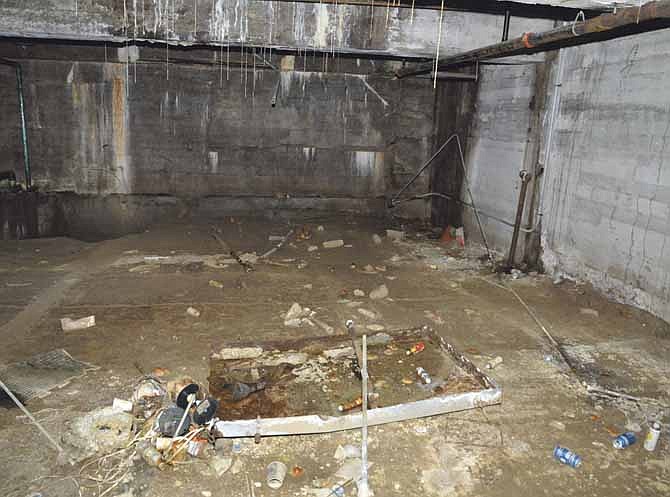State House officials will hold a noon ceremony Monday, marking the 100th anniversary of the groundbreaking for construction of the Missouri Capitol - the new building required after a Feb. 5, 1911, lightning strike and fire destroyed its predecessor.
But, even as they celebrate the start of construction for the current Capitol, some of its workers will tell you the current building needs some major repairs.
For some Capitol workers, rainy days like we've had recently mean an increasing problem with leaks. Leaky windows. Or water dripping through the ceiling, aiming for mechanical equipment below.
Because, except for the people who work there, most Missourians likely are not aware that some of the offices and storage areas in the state Capitol basement are "outside" the lines defined by the building's limestone walls.
They're under the terrace around the building - or under the circular drive that carriages used to use to let passengers off under the protection of the expansive steps pouring out of the Capitol, past the Thomas Jefferson statue and ending on the South Lawn.
But when it rains, water seeps through the stone and concrete - especially if there are cracks.
Some of the $50 million proposed for Capitol improvements in the capital improvements bill the House passed Thursday would go for those repairs, state Budget Director Linda Luebbering said Friday.
"The major things that would be done in the Capitol Building, itself, is the stone repairs," she said. "That's not just the stone work but, you're going to have to renovate the substructure, like they did (last year) when they re-did the west steps."
The stonework repairs will include the replacement of some stones deemed beyond-repair, she said.
And the places where the walls meet the ground will be waterproofed, too, to stop those leaks.
"The windows are going to be a big issue, as well," Luebbering said. "The windows won't actually be replaced, because they are historic windows.
"But they need to repair the gaskets and the hardware and stuff, because they're not air-tight and they're not even water-tight in some situations."
The current windows were installed in the mid-1980s.
The Capitol is on the National Register of Historic Places, but the windows work won't create any problems.
"This project would continue to respect/restore the original context and style of the original windows," Luebbering said.
And not all of the windows may need to be done, she said, as Office of Administration officials decide which parts of the building are the most vulnerable to leaks and problems.
"Once we know how much (money) is available (for the work), OA will put together a priority list," Luebbering said, "a list of what makes sense."
She also noted the repairs won't be limited to the Capitol.
"We'll also have to look at some of the other buildings in the complex," Luebbering said. "I know that we do still have some work to do on the stones at the Truman Building, for example.
"They have done some of that stone work at the Truman Building, where you have some stones that are coming loose - a public safety issue."
The budget bill also proposes spending $38 million for a new state office building on the former Missouri State Penitentiary grounds, but there are no specifics to that plan, yet.
House Budget Chairman Rick Stream, R-St. Louis County, said during Thursday's debate: "We're going to construct a new state office building on the prison site, then we're going to move state departments and agencies into that building from leased space around the capital region.
"This is space that is leased from private developers. ... When we get the building built and start moving these agencies in, we'll begin to save that money on the leases."
Others have suggested that the state Transportation Department's Central Office would use the new building, while the General Assembly takes over the MoDOT Building on the southwest corner of Jefferson Street and West Capitol Avenue.
Dave Nichols, MoDOT's new director, said Friday in a statement: "We don't know enough of the details yet, but we are delighted to cooperate with the Legislature on a long-term vision for facilities that allow us to do the very best job for the citizens of Missouri.
"At the same time, we remain committed to putting every possible dollar that is dedicated to transportation through the State Road Fund into taking care of Missouri's roads and bridges."
Luebbering told the News Tribune: "I think there's a lot of planning that still has to happen" before any of those decisions are made.
She noted the capital improvements bill actually covers two budget years, from July 1, 2013-June 30, 2015.
"Some of these things are more than two-year projects," Luebbering said, "so we probably will look at re-appropriating some of the money in 2015."
Capital improvements chances
Even though the House passed a capital improvements bill last Thursday, some are wondering what its chances of getting to Gov. Jay Nixon's desk really are.
State Budget Director Linda Luebbering acknowledged Friday: "We're all agreed the best use of the money is one-time (expenses), and these are certainly one-time investments.
"(But) we've got a lot of (potential) discussion that has to happen before we know what's going to go on there."
However, she noted, the capital improvements bill is a "budget" bill that, by constitutional mandate, must be passed by the General Assembly no later than 6 p.m. this coming Friday.
And if Nixon does sign the bill proposing to spend $50 million on Capitol repairs and $38 million on a new state office building on the former Missouri State Penitentiary grounds, among other things, people wonder if the money really will be spent.
"This is just appropriation authority," Luebbering told the News Tribune. "The governor has made it clear, we've got to make sure that we have the revenue before we start any of this."
Nixon last week proposed adding $86 million in general revenue funds to the two-year capital spending bill - $13 million for planning and design of a new Fulton State Mental Hospital, $28 million for structural repairs to the state Capitol, and $45 million for improvements at Missouri State Parks.
When the House approved the bill hours later, it proposed spending $121 million more in general revenue funds.
The lawmakers agreed with Nixon on the $13 million for Fulton State Hospital.
But the Capitol repairs line was increased $22 million, to $50 million.
The governor's state parks proposal was cut by $25 million, to $20 million.
And the House added the $38 million for "planning, design and construction of a state office building including space for and renovation of the Missouri Department of Transportation Central Office."
The money was added to the budget bills last week, because state revenues in the past couple of months have climbed much higher than budget planners predicted a year ago.
"The April General Revenue Report from the state budget director (shows) 2013 fiscal year-to-date general revenue collections up 11.2 percent from last year," Nixon said in a Thursday news release. Revenues for April 2013 were 27.4 percent higher than April 2012.
Like nearly all state government budgets since the John Ashcroft administration in the 1980s, the 2012-13 state budget that currently guides state operations, and the 2013-14 budget still being written by lawmakers, are built around a "consensus revenue estimate" of how much money the state will take in during the 12-month business year.
"Remember, the consensus revenue estimate is an agreement between the governor, the Appropriations chairman of the Senate and the House Budget chairman," state Rep. Chris Kelly, D-Columbia and a former House Budget chairman, told colleagues during Thursday's debate.
"And the three of them have gotten together and agreed that, because of the revenue increases, this (capital improvements plan) is a reasonable way to use one-time money."
Senate Appropriations Chairman Kurt Schaefer, R-Columbia, told the News Tribune on Thursday: "Keep in mind where we were a week ago on this was, both the governor and the House refusing to acknowledge the additional revenue.
"And it was the Senate position all along to say, first of all, we have to acknowledge that that additional, one-time revenue exists."
And state Sen. Mike Kehoe, R-Jefferson City, who is a member of the Appropriations Committee, added: "I'm glad that we're at least having this discussion.
"We had, for a while, a hard time trying to get everybody to agree that the consensus revenue estimate we're working on was going to be a little bit short."
The House passed the bill Thursday by a 120-30 voter margin.
The bill is to be assigned to the Senate's Appropriations Committee early Monday afternoon.
If senators decide to make changes to the House-passed bill, it would have to go through a conference committee and still be approved by both chambers by week's end.
"I absolutely agree with the governor, that if there is some excess funding out there, the first place it needs to go is the Fulton State Hospital," state Sen. Jolie Justus, D-Kansas City, told the News Tribune last week.
"As far as the other priorities, I think there's a lot of folks who have different priorities - I don't know if the Capitol and the state parks are what would be at the top of my list."
Although elected by Kansas City voters in 2010, Justus' 10th District was moved by redistricting to include Callaway County and the Fulton Hospital.
While Justus' comments indicate there could be a debate about the priorities in the capital improvements bill, the Friday deadline also could weaken senators' desire for that debate.
Kelly cautioned lawmakers during Thursday's House debate that the current economic good news doesn't mean a permanent return to constantly increasing revenues.
"Remember, none of them are sure, yet, that this is going to be a permanent increase," he said. "So, it makes sense not to lock it into the budget for salaries or offices or things like that, but use it to improve our capital plant."
Accompanying photo: Capitol basement
Accompanying photo: Capitol windows
Accompanying photo: Rust problems
Related article:



